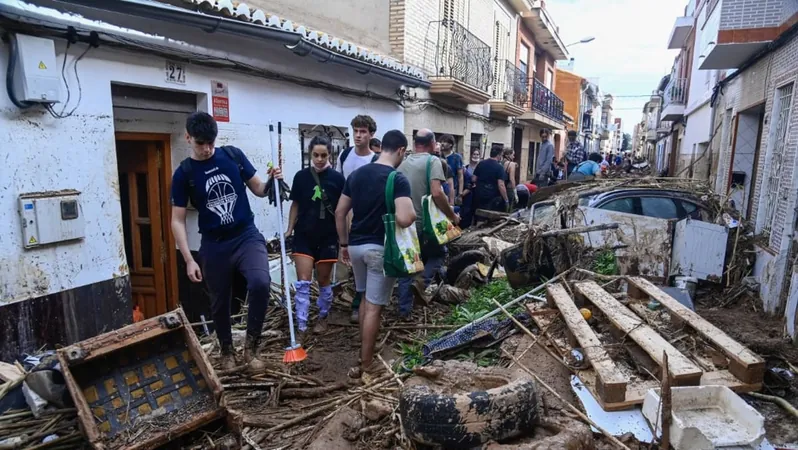
Spain Mobilizes 10,000 Troops to Tackle Devastating Floods in Valencia: What You Need to Know
2024-11-02
Author: Mei
Introduction
VALENCIA: In a decisive move following one of the deadliest floods in decades, Prime Minister Pedro Sanchez announced on Saturday (November 2) that Spain will deploy an additional 10,000 troops and police officers to the eastern region of Valencia, which has been ravaged by catastrophic flooding. The disaster has resulted in over 200 fatalities, making it the second deadliest flood in Europe this century.
Rescue and Recovery Efforts
With hopes dwindling for survivors more than three days after torrential rains submerged towns and devastated infrastructure, authorities are focused on recovery efforts. Almost all reported casualties have occurred in the Valencia region, where thousands of emergency personnel are engaged in clearing debris and searching for missing individuals.
Sanchez revealed in a televised address that the government had responded to the request from regional leaders for enhanced support, ultimately agreeing to send 5,000 additional troops alongside an equal number of police officers and civil guards. He emphasized that this is Spain’s largest peacetime deployment of military and security personnel for a natural disaster.
Expected Casualties Rise
As recovery operations continue, officials have indicated that the number of casualties is likely to rise. The priority now lies in restoring order and delivering essential aid to devastated towns, many of which have been isolated without food, water, or electricity for days. Critics have raised concerns over the effectiveness of pre-flood warning systems and have voiced frustrations regarding the speed of the government response.
"I am aware the response is not enough; there are severe shortages. Towns are buried under mud, and desperate residents are searching for their loved ones,” Sanchez admitted, acknowledging the challenges faced in ground-zero towns like Alfafar and Sedavi, where residents continue to clear mud from their homes.
Conditions on the Ground
Local authorities implemented access restrictions to roads to facilitate emergency and rescue operations, as many areas are still unaccounted for. Interior Minister Fernando Grande-Marlaska indicated that it was “reasonable” to anticipate more fatalities, although the scale of the disaster has complicated efforts to establish a complete count of the missing.
On a positive note, Sanchez reported that 94 percent of homes impacted by power outages have had their electricity restored, and about half of the disrupted telephone lines are functional again. While some major roads have reopened, local routes remain heavily damaged, complicating travel and relief efforts.
Community Resilience and Solidarity
In a heartwarming display of community resilience, thousands of volunteers took to the streets to assist in cleanup efforts, armed with shopping trolleys and cleaning supplies. Susana Camarero, deputy head of the Valencia region, mentioned that some municipalities are feeling overwhelmed by the outpouring of solidarity and food donations from the public.
The movement of citizens aiding in recovery work continued into Saturday, with approximately 1,000 volunteers making their way from the coastal city of Valencia to nearby flooded towns, although authorities have cautioned against congestion that may hinder emergency services.
Climate Change Implications
The unprecedented storm that triggered these floods was a result of a complex weather phenomenon, combining cold air masses with warm Mediterranean waters—conditions that are increasingly exacerbated by climate change. Scientists continue to warn that human-induced climate change is intensifying the severity and frequency of extreme weather events, underscoring the urgency for both immediate humanitarian action and long-term climate strategies.
Conclusion
Stay tuned for more updates on this evolving situation as Spain rallies to recover from this environmental catastrophe.





 Brasil (PT)
Brasil (PT)
 Canada (EN)
Canada (EN)
 Chile (ES)
Chile (ES)
 Česko (CS)
Česko (CS)
 대한민국 (KO)
대한민국 (KO)
 España (ES)
España (ES)
 France (FR)
France (FR)
 Hong Kong (EN)
Hong Kong (EN)
 Italia (IT)
Italia (IT)
 日本 (JA)
日本 (JA)
 Magyarország (HU)
Magyarország (HU)
 Norge (NO)
Norge (NO)
 Polska (PL)
Polska (PL)
 Schweiz (DE)
Schweiz (DE)
 Singapore (EN)
Singapore (EN)
 Sverige (SV)
Sverige (SV)
 Suomi (FI)
Suomi (FI)
 Türkiye (TR)
Türkiye (TR)
 الإمارات العربية المتحدة (AR)
الإمارات العربية المتحدة (AR)